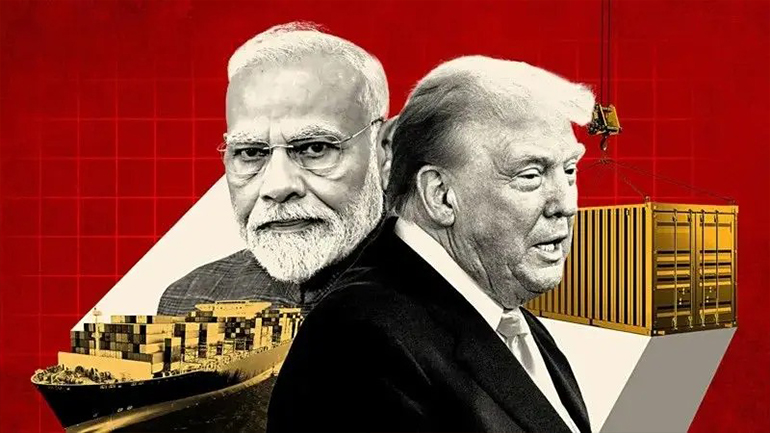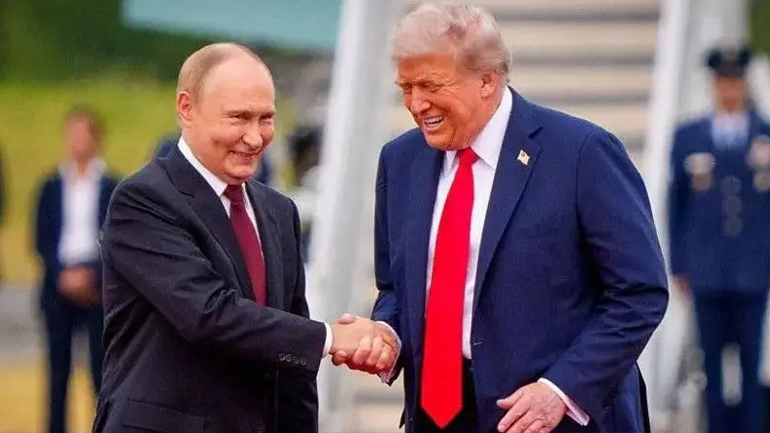

The announcement of additional US tariffs by President Donald Trump against India may prove to be either a blessing or a burden; only time will tell. For now, however, it appears that this move is not only strengthening India-Russia relations but also reducing tensions between India and China. Meanwhile, White House Press Secretary Caroline Levitt said on Tuesday, August 19, 2025, that Trump has imposed sanctions on India to pressure New Delhi into helping end the Russia-Ukraine war. Earlier the same day, US Treasury Secretary Scott Bassett accused India of profiteering by reselling Russian oil, while regarding China he noted their “diverse oil inputs.” These remarks came shortly after Trump imposed a total 50% tariff on Indian trade, including an additional 25% tariff effective August 27, due to India’s purchase of Russian oil. It is worth noting that after Trump’s meeting with Russian President Vladimir Putin in Alaska on August 15, many speculated that if the talks went positively, the additional tariffs on India might be removed. Through negotiations, New Delhi also hoped to ease the original 25% tariff. However, that did not happen, and Washington’s anger now seems to be directed more at India than at Russia or China.

Has this become a matter of honor for the US President and Modi?
Peter Navarro, the White House Trade and Manufacturing Advisor, recently wrote an article in the British newspaper Financial Times after the meeting between Donald Trump and Vladimir Putin, in which he strongly criticized India. Navarro wrote: “American consumers are buying Indian goods. India is using the dollars earned from these sales to purchase cheap Russian oil. India refines Russian oil and sells it across the world. Indian profiteers have become silent partners of Russia. Russia continues its attacks on Ukraine, and India is helping in this.” He further wrote that if India wants the United States to consider it a strategic partner, then it should behave accordingly. Looking at the situation, it seems that Washington’s resentment is more against India than Russia or China. But the question remains: why? Is it really just about India buying Russian oil, as claimed in these statements, or is there something deeper behind it? Renowned Pakistani writer and political analyst Pervez Hoodbhoy believes that the reason for Trump’s hard stance is not oil, but rather an ego clash between Trump and Modi. Hoodbhoy explained: “Trump did not like the fact that Modi refused to give him credit for the ceasefire. For Modi, it was politically impossible at home to accept that the ceasefire happened because of Trump’s orders. In this situation, I believe it is more of a clash of egos between the two leaders than anything else.” Before the Alaska meeting between Trump and Putin, US Treasury Secretary Scott Bassett had already warned India of more tariffs, stating that if the talks with Putin did not go well, tariffs against India could be further increased. He also said that Europe should be included in this decision against India.

Even after meeting with the Russian President, America's attitude towards India has not changed.
The think tank Ananta Centre, which works on foreign policy issues, also reacted. Its CEO, Indrani Bagchi, reposted the video clip of Scott Bassett’s statement and wrote: “This is very dangerous. The West believes that India is special to Russia, and so, to please Putin, they punish India. Putin never compromises on his interests, nor does he care if India suffers any damage. In such a situation, India will become a punching bag.” The growing US pressure on India is not limited to Trump alone; many analysts are also looking at Russia with suspicion. Tanvi Madan, Senior Fellow at the Brookings Institution, reposted Indrani Bagchi’s post, writing: “If Trump troubles India, Putin will benefit. If India’s relations with the United States deteriorate, there will be increasing demand within India to strengthen ties with Russia. In such a scenario, India may appear more willing to make agreements with China.” On X (formerly Twitter), Tanvi Madan further wrote: “Some people in India think we will return to strategic autonomy or move closer to China. I don’t think Trump thinks about India that way. At this moment, Trump does not care about competing with China. Many people here believe that India can never give up strategic autonomy.” Madan also observed that Indian citizens are not as worried about the deepening ties between Russia and Pakistan as they are about the relationship between Pakistan and the United States. She added: “At one time, Russia supplied more weapons to Pakistan than the United States did. India has also raised complaints about this, but I don’t believe India’s complaints will push Russia out of the FDFA project with Pakistan. Russia knows that India’s conflict with the United States is not permanent, and that the US needs access to the Indian market. Recently, cooperation between Russia and Pakistan has increased, and after four months, there has also been a rise in defense cooperation between Russia and the Taliban.”
Tanvi Madan further wrote: “An improvement in Russia-US relations could reduce pressure on US-India ties. But many in India believed that a US-Russia friendship would push Russia further away from China. I am certain that will not happen. Trump had said that he wanted deals with both China and Russia.” She added: “In my view, this will create more problems for India. Putin sees flattery as a tool, and we should not mistake it for a sign of weakness. People should remember the conversations between Boris Yeltsin and Bill Clinton, or those during the 1960s–70s. Russia has never hesitated to gain benefits, even at India’s expense. The US is not alone in this matter.” Many observers believe that whenever Putin feels he can exploit the ego of the US president, he happily does so. For example, after Operation Sundoor, Trump and Putin had a phone conversation. Following that call, Russia issued a statement giving Trump credit for the ceasefire. This Russian statement came at a time when India was rejecting Trump’s claims. Earlier, in 2019, when tensions between India and Pakistan escalated, Russia had also offered to mediate. Dr. Rajan Kumar, Associate Professor at the Centre for Russian and Central Asian Studies at Jawaharlal Nehru University (JNU) in Delhi, says that India faces a major challenge on the foreign policy front. According to him: “India is under increasing pressure to choose a side, which in no way benefits India. India cannot abandon Russia for the US, nor can it solely depend on Russia.” He further explained: “This pressure on India is quite evident. Prime Minister Modi’s participation in the SCO (Shanghai Cooperation Organization) summit shows that India wants to be more active in non-US groups. Modi is now heading to China, even though only a few months ago China supported Pakistan in its conflict against India.”
On Tuesday, Chinese Foreign Minister Wang Yi met with Indian Prime Minister Narendra Modi in New Delhi. Following this, Wang Yi traveled to Pakistan, where, according to the Chinese Foreign Ministry, he will participate in a strategic dialogue with Pakistan’s foreign minister. Commenting on Wang Yi’s visit, India’s well-known strategic expert Brahma Chellaney wrote on the social media platform X: “During the military clashes between India and Pakistan from May 7 to 10, China acted like an invisible third party. China provided Pakistan with real-time intelligence, along with radar and satellite inputs. And this was stated by the Deputy Army Chief himself.” Chellaney further wrote: “Modi is scheduled to visit China later this month. This visit comes at a time when China has not vacated Indian-controlled territory in Ladakh since April 2020. Modi’s upcoming visit indicates that India has dropped its demand for restoring the status quo in Ladakh prior to April 2020.” After Wang Yi’s meeting with Indian Foreign Minister S. Jaishankar on Monday, China released a statement in Mandarin claiming that India had recognized Taiwan as part of China. However, India has made no official statement regarding Wang Yi’s visit. Lin Min Wang, an expert on China-South Asia relations at Fudan University in Shanghai, told the New York Times: “If India wants to improve its ties with China, Beijing will welcome it—but India will not receive any concessions. China will not compromise on its interests, nor will it end its support for Pakistan. India’s current stance is essentially based on strategic calculations.” He added: “Amid deteriorating relations with the United States, India has decided to improve its ties with China. I believe China is examining these moves very carefully.” Indian-American journalist Fareed Zakaria, speaking on CNN, said: “Donald Trump’s hostility toward India is a major strategic blunder.” Zakaria explained: “For the past 25 years, the United States has viewed India as a strategic partner, but Donald Trump is changing that policy. India was considered crucial for the US to counter China’s growing influence in Asia. But Trump insulted India by calling its economy ‘dead,’ when the truth is that India’s economy is growing rapidly.” He concluded: “Even if Trump changes his approach toward India now, the damage has already been done. Distrust of the US has increased in India. Indians feel that America has revealed its true face.”
Powered by Froala Editor